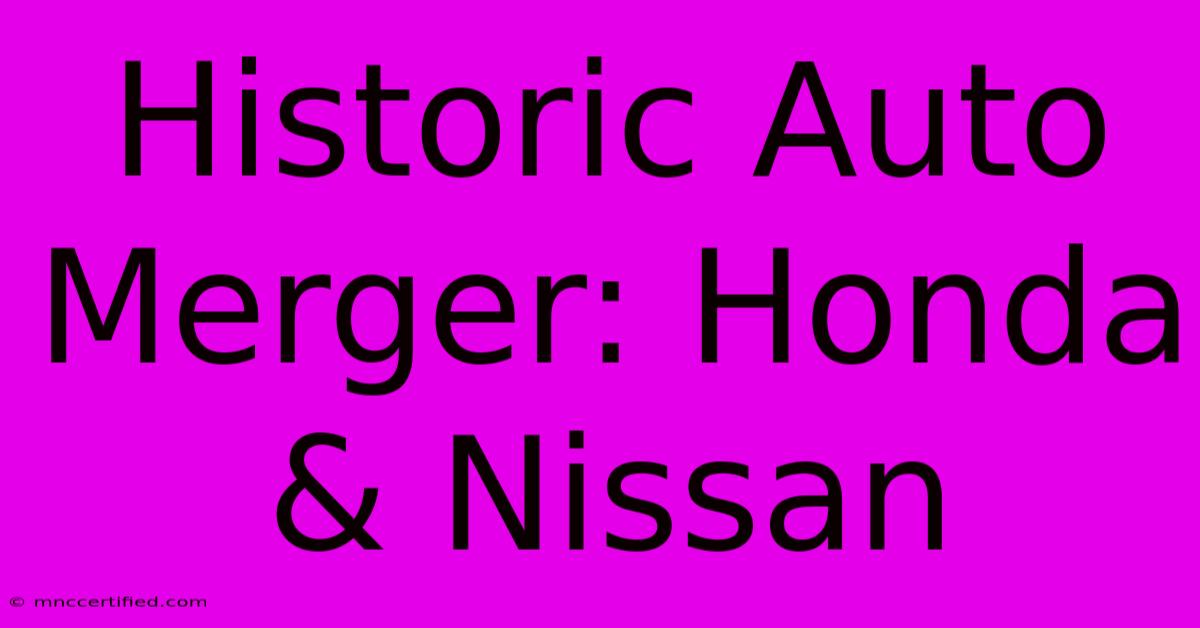Historic Auto Merger: Honda & Nissan

Table of Contents
Historic Auto Merger: Honda & Nissan – A Fictional Exploration of a Potential Powerhouse
The automotive world is constantly shifting. Mergers and acquisitions are a common occurrence, shaping the industry landscape and influencing the vehicles we drive. While a merger between Honda and Nissan hasn't happened (yet!), exploring such a hypothetical scenario offers a fascinating glimpse into the potential benefits and challenges of such a monumental event. This article delves into the possible ramifications of a Honda and Nissan merger, examining the potential synergies, competitive advantages, and inherent risks.
Potential Synergies: A Powerful Partnership
A hypothetical merger between Honda and Nissan, two giants in the automotive industry, presents numerous potential synergies. Both companies boast strengths in different areas, creating opportunities for significant cost savings and enhanced market reach.
Shared Resources and Economies of Scale:
- Manufacturing: Combining manufacturing facilities could lead to significant cost reductions through shared resources and optimized production lines. This would improve efficiency and potentially lower prices for consumers. Think economies of scale on a grand scale.
- Research & Development (R&D): Joint R&D efforts could accelerate innovation in areas like electric vehicles (EVs), autonomous driving, and fuel-efficient engine technology. Sharing the financial burden of developing cutting-edge technologies would be a significant advantage.
- Supply Chain Management: A combined entity could negotiate better deals with suppliers, securing crucial components at lower prices and potentially reducing supply chain vulnerabilities. This is critical in today's volatile global market.
Expanded Market Reach and Brand Diversification:
- Global Presence: Nissan's strong presence in certain markets, coupled with Honda's established global footprint, would create a truly dominant global player. This expanded reach could unlock new sales opportunities and diversify revenue streams.
- Brand Portfolio: The merger would create a broader portfolio of vehicles, catering to diverse consumer preferences and price points. This diversification would reduce reliance on specific models or market segments, mitigating risk.
- Technological Cross-Pollination: Both companies have unique technological strengths. Imagine a Nissan benefiting from Honda's hybrid technology or a Honda incorporating Nissan's advanced safety features. The resulting cross-pollination of technology could be revolutionary.
Competitive Advantages and Market Dominance
A combined Honda-Nissan entity would become a formidable force, capable of competing effectively with the industry's largest players, such as Toyota and Volkswagen.
- Increased Market Share: The merger would dramatically increase market share, potentially making it the world's leading automotive manufacturer. This increased scale would provide greater negotiating power with suppliers and retailers.
- Enhanced Brand Recognition: Combining two well-established brands would create an even stronger brand identity, enhancing recognition and customer loyalty globally.
- Stronger Bargaining Power: A larger entity would possess significantly more bargaining power when negotiating with governments, suppliers, and other stakeholders.
Challenges and Potential Risks:
Despite the potential benefits, a Honda-Nissan merger would not be without its challenges:
- Cultural Integration: Integrating two distinct corporate cultures could prove difficult. Differences in management styles, organizational structures, and employee values could lead to conflicts and hinder efficiency.
- Job Security Concerns: Mergers often result in job losses due to redundancies. Addressing employee concerns and ensuring a smooth transition would be crucial to minimize disruption and maintain morale.
- Regulatory Hurdles: Antitrust regulations could pose significant hurdles, requiring extensive legal and regulatory review to ensure the merger complies with competition laws.
Conclusion: A Hypothetical Powerhouse
A hypothetical merger between Honda and Nissan presents a compelling case study in the potential benefits and challenges of large-scale corporate mergers in the automotive industry. While the synergies and competitive advantages are significant, careful planning and execution are crucial to navigate the inherent cultural, operational, and regulatory hurdles. The outcome, however, could be the creation of a global automotive powerhouse unlike any other. Only time will tell if such a union ever becomes a reality.
Keywords: Honda, Nissan, auto merger, automotive industry, merger and acquisition, synergies, economies of scale, R&D, supply chain, market share, brand diversification, global presence, competitive advantage, challenges, risks, cultural integration, job security, regulatory hurdles, hypothetical merger.

Thank you for visiting our website wich cover about Historic Auto Merger: Honda & Nissan. We hope the information provided has been useful to you. Feel free to contact us if you have any questions or need further assistance. See you next time and dont miss to bookmark.
Featured Posts
-
Trumps Panama Canal Power Play
Dec 24, 2024
-
Honda Nissan Merger Third Largest Automaker
Dec 24, 2024
-
Joel Embiid Ejected After Referee Dispute
Dec 24, 2024
-
Happy Festivus Your Guide To Seinfelds Holiday
Dec 24, 2024
-
Gaetz Ethics Probe Sex Payment Findings
Dec 24, 2024